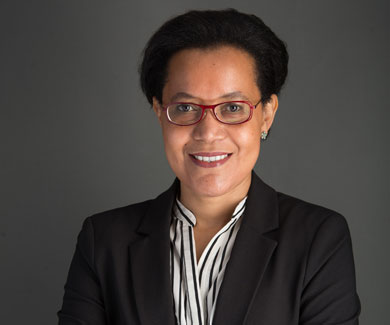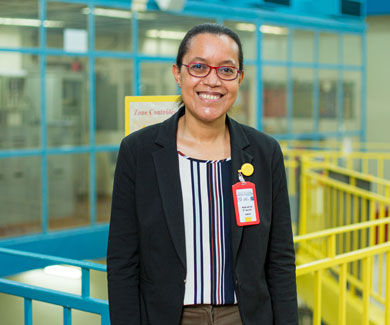Raïssa Malu visited the campus of the International Centre for Theoretical Physics (ICTP) for the first time between 24 and 27 May, along with her friend, fellow physicist and collaborator Stéphane Kenmoe.
A physicist by training and by family tradition, Malu is also an author of text books, an international educator specialized in the reform of science and maths curricula in secondary schools, the organizer and promoter of the Science and Technology Week in her native Democratic Republic of the Congo, an Honorary Member of her country's Presidential Panel to the African Union, the Director of the non-profit association "Investing in People"—an organization dedicated to promoting young African scientists with a focus on women—and, last but not least, the daughter of Felix Malu Wa Kalenga, one of the founders of the then-Third World Academy of Sciences, the former name of The World Academy of Sciences (TWAS).
This said, it was not her impressive resume that struck me in a recent inspiring conversation with her and Stéphane Kenmoe1 but the strength of her ideas, conveyed in the calm and soft-spoken way of someone who leads by example.
It all started while discussing the topic of science communications with Kenmoe, during which Malu stressed the importance of the 'conveyor' of a given message: "It's not only messages themselves about science that are important, but also who delivers them," she said. "Having, for example, a woman or a black woman scientist delivering a message can have as much resonance as the message itself. We need science to be more inclusive", she added.
On the long-standing question of scientific brain drain from Africa, Malu identified two main causes: political instability and lack of financial resources. To tackle the latter, she underlined the importance of increasing collaborations—North-South and South-South—in the attempt to bring back the African diaspora, if not permanently, at least temporarily, by providing more research opportunities, by 'nurturing' those great minds with training, and sustaining them in their career path, which is not the current status of things. "My experience in the Presidential Panel to the African Union showed me that African countries would indeed benefit from pooling together resources available for research and development," she pointed out.
This 'nurturing' can only be sustained by a very strong political will, by realizing, at decisionmaking levels, the pivotal role that African scientists play in the development of their own countries and their continent. And this has exactly been the purpose of Malu's work in the last ten years: to create and develop a science and research culture in and for Africa, by showing and explaining to the general public, decisionmakers and the private sector alike what scientists do and how their work affects and improves the life of their communities, by showing and explaining what is done in labs and universities across the continent, and bringing all resources together, thus creating and sustaining enabling conditions for African scientists to return and counter the brain drain.
Still in connection with the topic of brain drain, Malu also talked about another question that affects the career path of many African scientists: discrimination, ethnicity- or gender-based. And once more, she stressed the importance of an inclusive science, which would encourage individual researchers to return to Africa, if they were offered real and sustainable career opportunities.
To counter gender discrimination, Malu stressed that it was extremely important to create new role models, to stop gender-based violence in academic institutions, to make the presence of women in science the new normal, and to have more women in strategic positions. And towards this goal, she has been working relentlessly talking to parents, showing, in different contexts and venues, how science can be enjoyable and interesting, putting young female scientists at the forefront, as trainers and facilitators, of the Science and Technology Week in the Democratic Republic of the Congo, the ninth edition of which took place from 16–22 April.
UNESCO reports that "[i]n the Democratic Republic of Congo, science and technology are not disconnected from culture. On the contrary! They talk to each other, sometimes moving apart and (re)discovering each other. They reinforce each other." No small feat. As the week's main promoter, Malu has the ambitious goal of changing the current culture step by step, with the soft determination that seems to characterize her.
The chat with Malu ended on a more personal note: her father, Professor Félix Malu Wa Kalenga, a scientist in the field of nuclear physics, and a principal player in the project for the construction of the nuclear reactor Mark II for the Centre Régional d’Études Nucléaires of Kinshasa, among many other things. Back in the days when such ideas were really revolutionary, he was a spokesperson for renewable energy, and produced one of the first studies about energy demand of Africa.
"I was very lucky to have the father I had," Malu said. "He was a really quiet man, and I became interested in physics watching him be himself. [...] He was my role model," she added. Words and life lessons are quite powerful in their simplicity.
She also realized how difficult it must have been for her father to be a scientist in the then-Zaire in the 1980s, and how relieved he must have felt in a place like ICTP, meeting fellow scientists who shared his worldview. "Abdul Salam had a really good idea," she added.
So, to close the circle, her visit to the ICTP campus in Trieste, and to TWAS in particular, was a sort of pilgrimage, where she connected to her father on many levels, as a scientist herself, but above all as a daughter.
So, while she had the privilege to sit "on the shoulders of a giant2" she built upon it, using that legacy to improve the science culture of her country and of Africa, and to improve people's lives, thus showing to be her 'father's daughter'.
Raffaella De Lia
1. A separate article on the conversation with Stéphane Kenmoe will be published shortly on this website.
2. From the heading of an article Raïssa Malu published, in English, on 25 November 2021 on the platform Afriscitech, dedicated to science in Africa.

